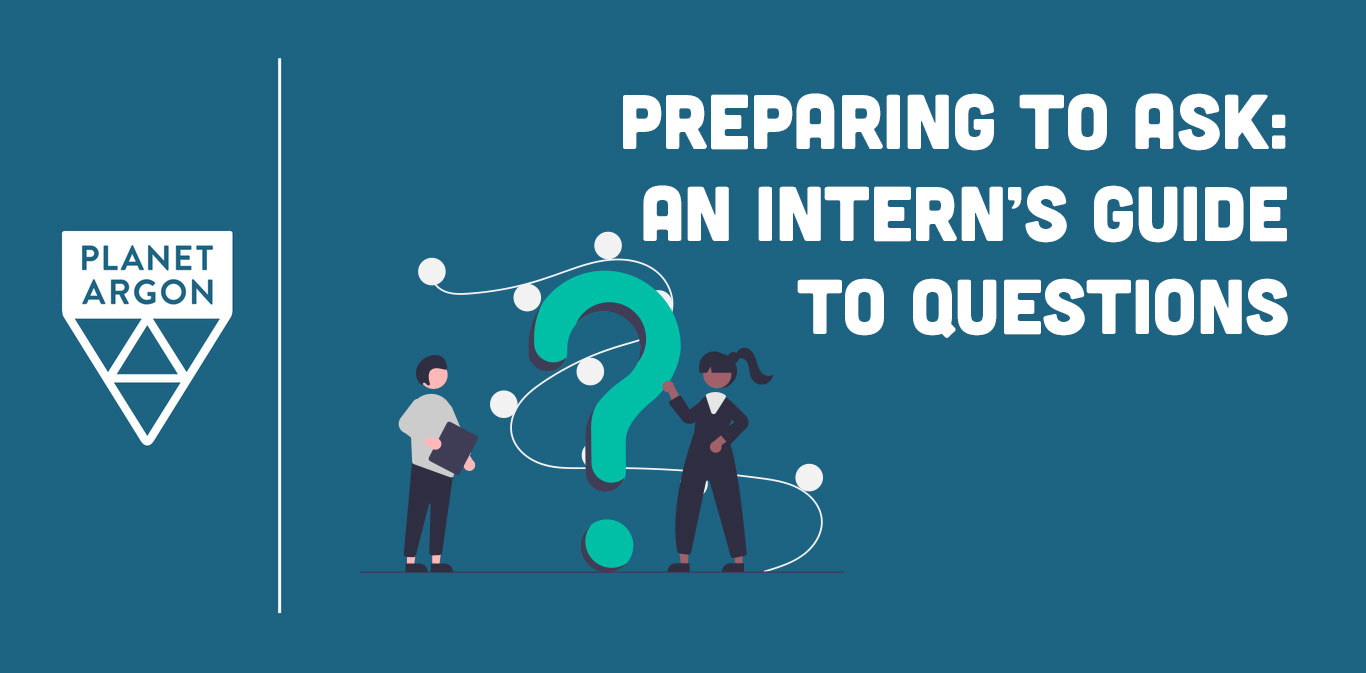
A quick glance at a few Medium articles and job descriptions will tell you a much sought-after quality in developers of all experience levels are those that are “prepared to ask questions.” That sounds simple enough, right?
That’s pretty encouraging seeing as I never seem to run out of questions myself. As I quickly learned during my internship at Planet Argon, asking questions isn’t so much an expectation as it is a requirement. Your manager and other developers need to be able to evaluate what you know and how you think so they can provide you with the projects that will help you succeed. After all, meaningful collaboration, new learning opportunities, useful information– they all start with questions.
“Ok, cool. I’ll just ask a lot of questions.”
Hang on.
I want to address a crucial subset here, one that not only delivers you the information you need, but allows you to demonstrate your value to the team, all the while introducing you to a new methodology that you can add to your toolbox. Allow me to share a few tips I’ve learned on how to ask a question.
Developer, Answer Thyself
If you’re like me, you could always use a little more information. You want to understand the landscape of the issue at hand. Now, this mindset can occasionally pose a problem, especially if say your ticket is addressing a submit button that needs to be centered instead of justified left. That’s a pretty silly example, but let’s roll with it.
In cases like these, it’s important to recognize and exhibit the knowledge you already have, remember you’re a developer. Take the opportunity to demonstrate agency to yourself. The first step to asking good questions is recognizing when you are capable of finding the solution.
“Alright, but my question is more complex than that. Where should I look?”
Do the Handbook
Chances are, the company you are with has a robust handbook filled with lots of troubleshooting tips, how-tos, best practices, and the all important style guide. These are your strongest allies when it comes to familiarizing yourself with the team’s standard operating procedures while exploring the projects you’ll be working on. The vast majority of my week 1-2 questions were answered from reading a handbook or other documentation.
Before long, part of my morning routine at Planet Argon was to fire up Confluence, check for updated documents, and read one or two that were new to me. Get in the habit of checking your company’s handbook regularly. Document control and maintenance is in place for a reason. And if there is one thing developers love, it’s easy access to the pertinent information, and the handbook is the place you will find it.
“But this ticket is tricky and my code is throwing errors. Can I ask now?”
Search Within Yourself the Internet
Whether you’re fresh out of code school, self-taught, or somewhere else on the continuum, you have used some form of crowdsourced knowledge base (GitHub, Stack Overflow, W3Schools) to find an answer. Just like the handbook, lean into these.
As a best practice for any internship or full-time position, employ due diligence. Make sure to consult online resources like these before reaching out to a peer. Why? Because they’re going to do the same thing if they don’t have an answer.
There is a special sense of comfort that comes from seeing the lead developer navigate to Stack Overflow.
Just remember: before you ask, take the time to follow some leads and turn over a few hefty stones but…
Beware of the Weeds
It’s easy to get stuck in the weeds looking for a solution. Sometimes I feel like I have a vacation house on the banks of Weed Lake just outside Weed City proper. Give yourself enough time to digest a handful of Google searches and Rails docs, taking note of what helps and what doesn’t. More on that later. The important thing is to do is pay attention to the clock.
If you’re still stuck after a half-hour of digging, it’s usually a good idea to (at last) start formulating a question.
Reaching Out
Intern Tip: Let your question be a demonstration of what you already know. Spend time providing a solid, yet pertinent summary of your issue. Remember those notes you took? Make a habit of taking organized and descriptive notes on an app like Evernote or Notion so you don’t keep cycling back through ineffective approaches.
You’ll have a record of what you’ve tried thus far, and, most importantly, you are prepared when the Senior Developer asks you “Well have you tried XYZ?”
At this point, the solution to your problem is something that you either a) overlooked or b) didn’t know to look for, and that’s ok. Do your best to fill in the gaps between A and B, remembering to take the time to identify learning opportunities as you encounter them.
There you have it! Now you’re asking questions like a pro. It might sound like a lot, but don’t worry, this process gets streamlined over time. Better yet, by practicing these steps you’re building your problem-solving skills, growing as a developer, and demonstrating several key qualities that companies look for in a new hire.
One of my goals at the start of my time at Planet Argon was to get better at finding solutions independently. After taking this approach toward reframing the way I think about questions, I saw results almost immediately. Best of luck!